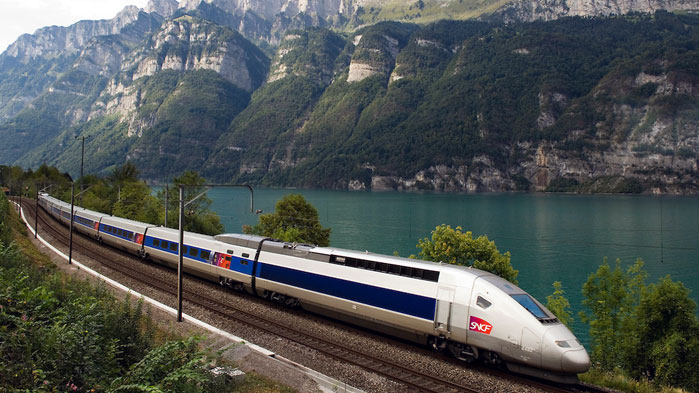Fast Trains? Americans Don’t Get It.

Talk to people about high-speed rail and you quickly discover that most Americans have a very fuzzy picture of how it works and what it can do. Many people visualize trains rocketing along at 200 miles an hour with passengers hanging on for dear life. The reality, of course, is that a French TGV traveling at 200 mph is a great deal smoother and more comfortable than Amtrak’s Southwest Chief crossing Kansas at one-third that speed.
I have a theory as to why there is still a debate in this country on the merits of high-speed rail. I think it’s because probably 80-percent of Americans have never traveled outside the United States and, therefore, have never ridden a high-speed train.
The sad fact is, only 38-percent of Americans own a passport. And that figure is significantly higher today than it was before 9/11 because passports are now required to cross the borders into Canada or Mexico. We can only speculate what percent of passport holders have actually been to Europe or Asia where high-speed trains are the preferred means of transportation..
There are, of course, valid reasons for not traveling outside the U.S. Some people won’t fly or can’t because of medical reasons. And there’s no doubt that travel to Europe is a lot more expensive than destinations within North America. An airline ticket from many cities in mid-Ameica to the East Coast will cost less than $200. But flying to London in mid-May will set you back at least $1200 … and that’s one way.
Then there’s the whole issue of terrorism. Some people won’t travel outside of the U.S. because they’re just too anxious about the possibility of being caught in a terrorist attack, no matter how remote the chances of that occurring might be.
Others say—and I do see the point—that they haven’t traveled abroad because there is so much they still haven’t seen right here in the U.S. I get that … I really do.
But, I submit, there are some unfortunate consequences to this insular mentality: Americans are too suspicious of foreigners, too critical of their politics, too afraid of terrorism, and too unwilling to consider different ways of doing things that have been commonplace and successful for years—passenger rail in general and high-speed rail in particular, for instance. The Japanese were first in Asia; the French were first in Europe. They’ll soon have high-speed trains in Uzbekistan, for heaven’s sake! Now… doesn’t that make you proud?



In reality, passenger rail infrastructure and speed is an incremental development. What is key to this successful development is for a passenger rail market built on the convenience and frequency of schedules, more so than even speed.
Indeed, more relevant than proposed 220 mph HSR, which remains unfunded, is to improve the infrastructure to support passenger rail up to 110 mph, operating on a frequent and convenient schedule. This is what will mark the difference in specific corridors, including: NYC-ALB, CHI-MKE, CHI-DET, CHI-STL, etc.
Our incremental approach can be very well supported by the proven Canadian and European manufacturers with plants already established in America.